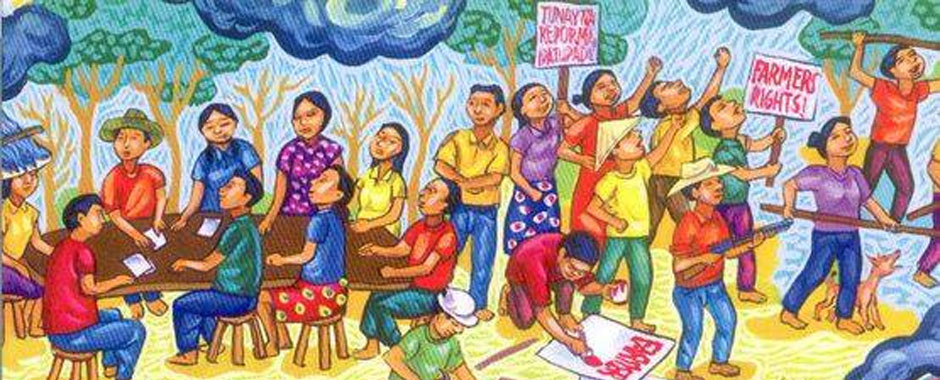Emancipatory Rural Politics: contextualising authoritarian populism and resisting, mobilizing and creating alternatives
Call for papers, Association of American Geographers 2018 annual meeting, 10-14 April, New Orleans
Organizers: Amber Huff (Institute of Development Studies and STEPS Centre) & Levi Van Sant (Georgia Southern University)
Two sessions are being organized for AAG 2018 as part of the Emancipatory Rural Politics Initiative (ERPI), which is focused on the social and political processes and practices, particularly in rural spaces, that are generating alternatives to regressive, authoritarian politics. More information about the Emancipatory Rural Politics Initiative and a link to the initiative framing paper published in The Journal of Peasant Studies is available from the ERPI website.
Submissions based on papers, conceptual pieces, case studies, and works in progress are all welcome. If you would like to contribute to one of the sessions, please submit a brief abstract or description of your proposed contribution along with your name, affiliation and email address by 15 October 2017 to Amber Huff at [email protected]. Please include ‘AAG 2018’ and the number of the session you would like to contribute to in the subject line. If your abstract is accepted for one of the sessions, you will need to register for the meeting, upload your abstract to the AAG annual meeting and send your assigned pin to the organizers no later than 25 October 2017.
Details of the sessions
Emancipatory rural politics I: contextualizing authoritarian populism
Discussant: Wendy Wolford (Cornell University)
Preliminary session abstract: Deepening inequalities, socioeconomic marginalization and exclusion, persistent poverty, fractured identities and loss of esteem are all features of rural areas today. All have been associated to differing degrees with failure of ‘progressive neoliberalisms’ and the rise of regressive and often contradictory forms of populism.
‘Authoritarian populism’ describes a broad politics, resonant with appeals to ‘common sense’ and ‘the people’, and replete with imagery of imagined golden ages of prosperity and plenty. It is characterised by a number of often-overlapping themes and phenomena. These include the rise in prominence of discourses of aggressive protectionism and nationalism; highly contested national elections; growing concern over the ‘mobile poor’, including refugees and migrants whose presence is posed as a threat to a shrinking resource base; increasing financialization, bureaucratization, securitisation and militarization across daily life, society and the environment; an intensification of extractive capitalism; and a radical undermining of the capacity of states to regulate private industry, while at the same time utilising state powers to privatise resources and services and increase surplus for a minority.
Contributions to this session will explore the emergence of authoritarian populism in diverse forms and rural spaces and, in different ways, address the overarching question of how rural landscapes and experiences shape and are being shaped by these wider politics. Contributions will use conceptual tools of political ecology alongside other approaches and methods from critical social science and radical practice to understand the emergence of contemporary manifestations of authoritarian populism, its historical and political-economic roots and precedents and its consequences in the rural world, with close attention to how these manifestations are associated with shifting relationships between different social classes and groups within society and between society and environment / natural resources.
Emancipatory rural politics II: resisting, mobilizing and creating alternatives
Discussant: Ian Scoones (Institute of Development Studies and STEPS Centre, University of Sussex)
Preliminary session abstract: The current political conjuncture has given rise to new forms and manifestations of authoritarian populism with wide-reaching implications. In this session, we ask what alternative politics – and political-economic practices – also emerge at this conjuncture? What are ‘emancipatory’ possibilities or ‘alternative’ rural politics in practice in settings that may simultaneously seem to have been left behind by globalized capitalism yet represent the new (or last?) frontiers of enclosure, extraction and financialization?
Informed by insights from political ecology, alongside other approaches and methods from critical social science and radical practice, contributions to this session will explore relationships between historical and contemporary rural struggles, forms of resistance and mobilization, and practices of imagining and creating alternatives, encouraging a comparative conversation.
How are new alliances being built between urban and rural movements and spaces, within and outside mainstream political formations? How and why do informal, unruly styles of politics intersect with or reject more formal organized movements and electoral and institutional politics? How have conflict and violence both closed down and opened up new spaces for the development of new forms of resistance, mobilization, and practices of imagining and creating emancipatory alternatives? How are power, class, the state, participation, citizenship, institutions and democracy conceptualized or contested? Contributions by or co-produced with those actively engaged in resistance and building alternatives are especially encouraged.
